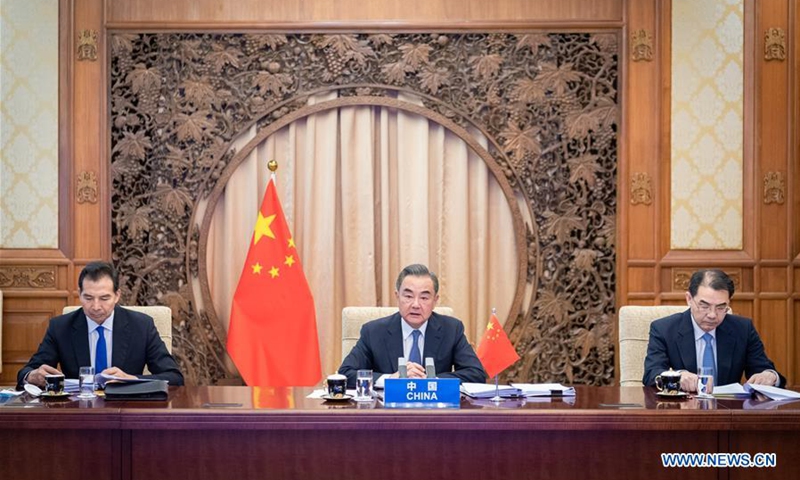
Chinese State Councilor and Foreign Minister Wang Yi attends the ASEAN-China foreign ministers' meeting via video link on Sept. 9, 2020. (Xinhua/Zhai Jianlan)
China’s State Councilor and Foreign Minister Wang Yi will visit Cambodia, Malaysia, Laos and Thailand from October 11 to 15 with a stop in Singapore, Chinese Foreign Ministry announced on Friday.
Wang’s trip came after the overseas visit of senior diplomat Yang Jiechi, a member of the Political Bureau of the Central Committee of the Communist Party of China (CPC), to four countries from Thursday to next Monday with his first stop in Sri Lanka.
In recent months, China and ASEAN countries have seen many visits by top officials. The Chinese Foreign Ministry said on Friday that at the invitation of Wang, Indonesian President's Special Envoy, Coordinator for Cooperation with China and Coordinating Minister Luhut Binsar Pandjaitan and Philippine Foreign Affairs Secretary Teodoro Locsin will visit China from October 9 to 10.
Analysts said senior diplomats’ visits would help further strengthen ties between China and ASEAN countries, amid more frequent US moves to sow discord around South China Sea issues and incite anti-China sentiment in the region.
China’s Ministry of Commerce said China and ASEAN have become each other’s largest trading partner, and total trade from January to August reached $416.5 billion.
Against the backdrop of the COVID-19 pandemic, trade data between China and ASEAN shows bilateral ties have great vitality and resilience. Better bilateral ties would also be very important for multilateralism and globalization, Xu Liping, director of the Center for Southeast Asian Studies at the Chinese Academy of Social Sciences in Beijing, told the Global Times.
Experts also noted that the current negative voices in some ASEAN countries about China emerged as some forces in these countries want to cooperate with the US, as the US is working to draw these countries into its side to contain China or to sow discord by using South China Sea issues. US diplomats in ASEAN countries also stood out in leading the attack on China.
For example, the Chinese Embassy to Sri Lanka released a statement on October 5 to condemn the US ambassador’s criticism of China-Sri Lanka ties during his interview with a local newspaper.
The spokesperson of the Chinese Embassy in Myanmar also released a statement on July 18 to refute the false argument made by the Chargé d' Affaires of the US Embassy in Myanmar, after the latter deliberately drove a wedge between China-Myanmar cooperation and ties in an article.
Xu said that small twists and discordant voices would not change better China-ASEAN ties, as countries in the region know that cooperation fits their interests. Claimants in South China Sea issues are also working together to push the Code of Conduct in the South China Sea based on consensus.
